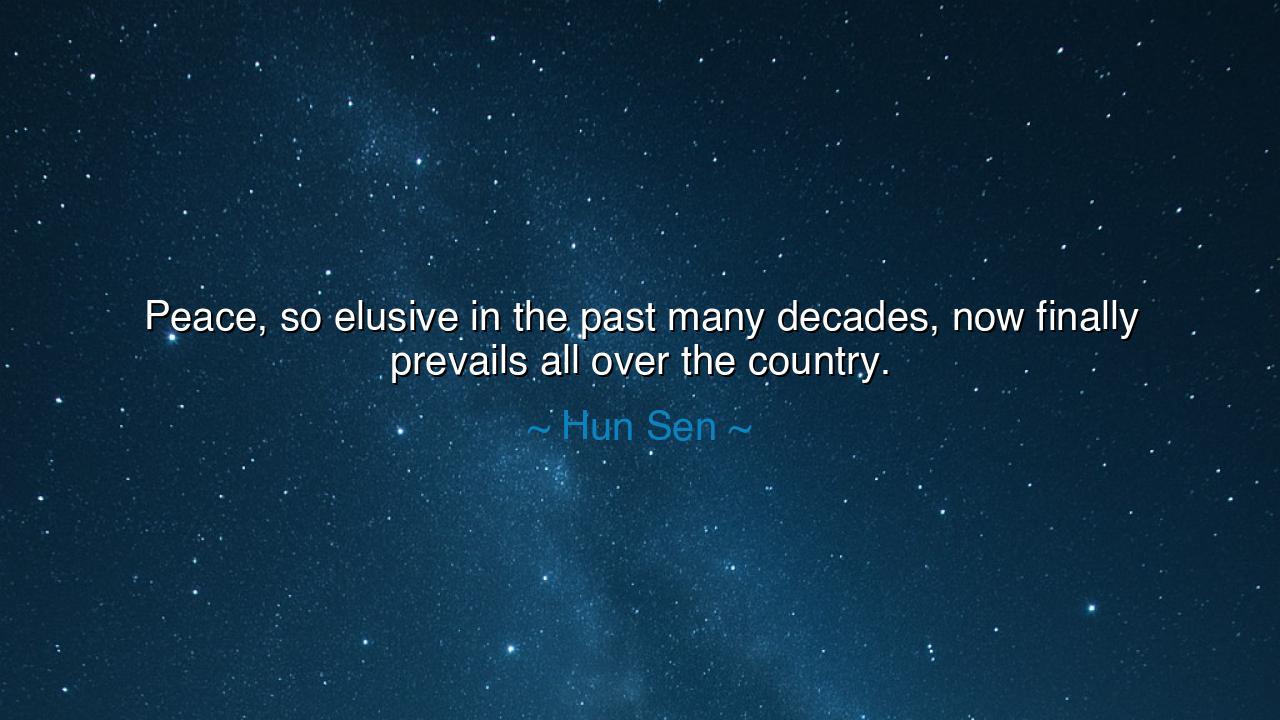
Peace, so elusive in the past many decades, now finally prevails






Hear the words of Hun Sen, who after decades of turmoil and strife proclaimed: “Peace, so elusive in the past many decades, now finally prevails all over the country.” This declaration carries the weight of a nation’s suffering and the sigh of relief after storms. It is not merely a statement of politics but a testimony to the human yearning for stability, for harmony, for a life no longer shadowed by war.
The meaning is clear and profound. Peace, described here as “elusive,” reminds us that it is not a simple gift, nor easily won. For decades Cambodia had been torn by civil war, genocide, foreign occupation, and the clash of ideologies. In such a land, the idea of peace seemed like a dream that forever slipped through the fingers of its people. Yet, at last, when guns fell silent and villages were no longer haunted by violence, Hun Sen could claim that this dream had become reality.
The origin of this statement lies in Cambodia’s long history of conflict. After the fall of the Khmer Rouge, after invasions and civil war, the nation’s people longed only for normalcy—the chance to farm, to raise children, to pray, to rebuild. Hun Sen, though controversial in leadership, seized the mantle of declaring that the era of bloodshed was ended. His words echoed what countless families felt: exhaustion with decades of destruction, and relief that at last the soil might be tilled in peace rather than soaked with blood.
History provides us with parallels. Consider the tale of Japan after World War II. For centuries a nation steeped in honor and war, it emerged from devastation broken and humbled. Yet when the fires ceased, the people embraced peace as their lifeline, building a new nation devoted not to conquest but to creation. Just as Hun Sen spoke of elusive peace finally prevailing, so too did the Japanese discover that from the ashes of long violence, a new future could be born if peace was cherished above all.
O children of tomorrow, learn this: peace is not merely the absence of war. It is the flowering of trust, the slow healing of wounds, the building of schools, homes, and futures. To achieve it after decades of turmoil is no small feat, but to preserve it requires even greater vigilance. For history shows us that peace can vanish as quickly as it comes if it is not guarded with wisdom, justice, and compassion.
Reflect upon your own life. Have you not felt that peace within your heart can also be elusive? Quarrels, regrets, ambitions, and fears wage wars within the soul. And when at last you taste inner peace, it feels as precious and fragile as the peace of nations. Just as a country must labor to keep its harmony, so too must the individual tend carefully to the peace of the heart.
The lesson is clear: peace, once gained, must never be taken for granted. Cherish it in your homes, preserve it in your communities, and demand it from your leaders. Build reconciliation where there has been bitterness, sow trust where there has been betrayal, and seek harmony even where differences remain. For when peace prevails—whether in a nation or in a single heart—the ground is fertile for joy, growth, and the light of a better future.
So let Hun Sen’s words endure, not only as a political declaration but as a timeless truth: “Peace, so elusive in the past many decades, now finally prevails.” May it remind us that the struggle for peace is long, but its reward is greater than gold—for it is the foundation upon which all human flourishing stands.






AAdministratorAdministrator
Welcome, honored guests. Please leave a comment, we will respond soon